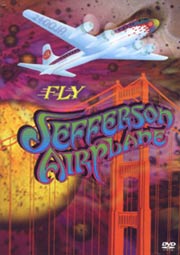
Jefferson Airplane
Fly Jefferson Airplane (DVD-V)
(Eagle Vision)
"Folk + Country-Blues at deafening volume": today this
is maybe the most common definition (a quite simplistic one, maybe carrying
derogatory overtones) when Jefferson Airplane are mentioned. Which doesn’t
happen very often – picture this: the first biography of the US group, once
so famous and controversial, was published last year, merely more than thirty
years after the end of their most musically inventive and original period.
An issue I talked about while reviewing their aforementioned biography: Got A Revolution! – The
Turbulent Flight Of Jefferson Airplane, written by Jeff Tamarkin.
I’d
say that the Jefferson Airplane albums from the "classic period"
still stand: Surrealistic Pillow (1967), the album featuring their only "big
hits": Somebody To Love and White Rabbit, is maybe more easily appreciated
in the context of their whole career; the better albums being the psychedelic
After Bathing At Baxter’s (’67), and the mature
statements titled Crown Of Creation (’68) and Volunteers (’69); released in
1969, Bless Its Pointed Little Head is a good demonstration of the group’s
excellent live delivery – let’s not forget that in the 60s not all "quality
groups" were good live.
Sure, the story of the Jefferson Airplane really needs a framework
(to simplify: the whole story about San Francisco and the "Summer Of
Love"), and so it’s not a "self-contained" story such as, say,
the one of The Velvet Underground. The Doors, too, are not so easy to get
without their context (not to mention an awareness of their musical background);
but the passing of time, and the loss of memory, make it easy to make a musical
output equal an "image" – something that happened to the Doors (long
ago), but not to the Airplane (yet?).
Grace Slick was the iconic presence of the group – and of a whole
period when "women in rock" were practically non-existent. A fact
that created tensions inside the group, and not a few distortions about the
members’ contribution to the collective. The fact was not groundless – just
remember that it was Slick who sang the group’s biggest hit, Somebody To Love.
That it was at least understandable can be demonstrated by the group’s performance
of White Rabbit on The Smothers Brothers Comedy Hour: we see Grace Slick,
sporting a sardonic air, carrying the news about the pharmaceutical innovations
of the day to America’s living-rooms.
So, Fly Jefferson Airplane talks about those two aspects of the story:
the Airplane’s music, and their zeitgeist. It does so by showing long interviews
with the members of the group and with other figures that were no less important:
the group’s manager, Bill Thompson; their studio hand, Pat Ieraci ("Maurice");
the man behind their light show, Glenn McKay. We hear about the group’s beginnings,
about the late Bill Graham, and about Festivals that today are part of the
rock folklore, i.e. Monterey, Woodstock, and Altamont. Fantastic pictures
by Jim Marshall, some of which will be new even to aficionados. The whole
succeeds in communicating the atmosphere of inventing something, of barricades
being built on both sides, of the importance of getting to a transcendent
dimension on stage.
The group’s musical variety is really best experienced on the studio
albums. It’s clear that Paul Kantner had a folk background, down to his "journalistic"
approach to lyrics; just as apparent is Jorma Kaukonen’s knowledge of the
blues, via the Orient (he had lived in Pakistan). "Romantic balladeer"
Marty Balin was also the author – and the dynamic singer! – of two songs à
la Otis Redding, It’s No Secret and Plastic Fantastic Lover. Grace Slick was
always inventive, and often very sarcastic. There was a jazz drummer, Spencer
Dryden; and one of the most original bass players in the whole history of
rock, Jack Casady (Slick’s expression of amazement while listening to Casady’s
bass solo on The Ballad Of You And Me And Pooneil is absolutely not to be
missed).
It’s No Secret shows the group before things got really serious,
while Somebody To Love and High Flying Bird come from Monterey. The aforementioned
White Rabbit clip is excellent. From The Smothers Brothers Comedy Hour we
also have Crown Of Creation (live) and Lather (mimed). A good live version
of The House Of Pooneil Corners comes to us from the rooftop performance (New
York, 1968) filmed by Jean-Luc Godard, The Ballad Of You And Me And Pooneil
is off Night At The Family Dog. We Can Be Together is a promo (in playback),
while Plastic Fantastic Lover and Volunteers, with new drummer Joey Covington,
are energetic performances originally featured on Go Ride The Music. In closing,
we have Kaukonen’s solo performance of Embryonic Journey from their Rock’n’Roll
Hall Of Fame induction ceremony.
Beppe Colli
© Beppe Colli 2004
CloudsandClocks.net | Dec. 19, 2004


